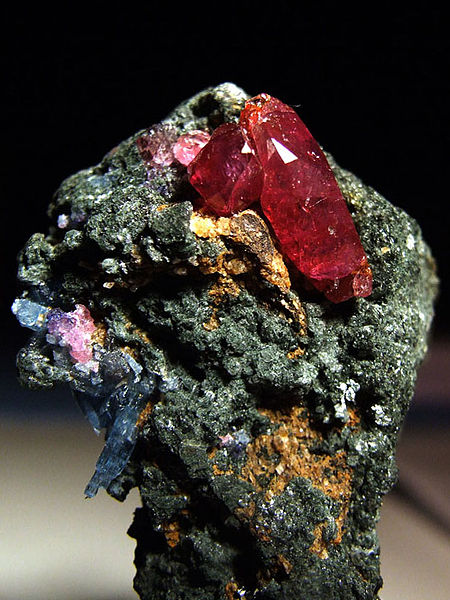5 Ways to Cope with a Mother Suffering from a Personality Disorder ~ for Daughters!
The peace rose.

In hopes that all daughters will feel appreciated, even if not by their own mothers.
It's a known fact that a lot of women suffer from mental illness. What's not necessarily well known is that the very people who suffer from it often project negative images of themselves on to their own daughters.
It's also known that many people suffer in silence with the stigmas of mental illness that society has attached to the term. While often, people with mental illness are wonderful people that raise families of their own, there are some who lack the ability to interact normally with their daughters.
This article is intended to explore the characteristics and definitions of five personality disorders. When someone endures abuse by someone with mental illness, the whole family dynamic changes. We are going to strategically review five ways to cope with a mother who has mental illness that has been abusive to her daughter(s).
Many people will say they've never known anyone with mental illness. In fact, some people may never even have heard of situations where a daughter is abused because of a mother's mental illness.
Make no mistake. These illnesses are real and are often swept under the carpet. People are either embarrassed or ashamed because of the stigma and lack of understanding there is about these issues. Often times, no one can relate to a woman who was raised by a mother with mental illness which leaves a person feeling alone in this world.
However, like anything else, just because someone has mental illness does not automatically make them abusive. We will review a case study of a young woman who suffered decades of abuse by her mother.
Women are beautiful. We are most often caretakers of others. We raise our families. We earn a living. We watch our children play outside while we bake fresh banana bread in our kitchens. We often have many talents. We are the ultimate expectation in a chaotic world.
Yet there is this one element to being a woman that is often misunderstood or is not recognized.
Women are often abused. We grow up, have a family, get married, and find ourselves not able to live an independent, mature life with the same applause we received when taking our first steps at age one.
Once we find ourselves dependent in situations where we expect nurturing and care from the same mothers we were born from, we often find ourselves at the mercy of someone we'd like to forget.
While at the same time being scrutinized and criticized for not respecting or bowing down to the one woman who gave us life.
Ultimately, in a cruel twist of fate, many woman marry men just like their mothers. They find themselves trapped in an endless sea of despair, exasperation, and desperation to remove themselves from the reality they are living.
How does one go on to freedom? How does one find themselves when they have been the victim of emotional and mental abuse, often physical abuse as well? How does one go beyond and never look back?
*Disclaimer. While the events in this article are written from actual experiences, this by no means replaces medical advice.*
Do you believe actions speak louder than words?
1. How to love yourself when others don't.
The first step to understanding how a daughter could feel unloved by her mother would be to examine the elements of the relationship.
For example, what does the mother say or do, or does not say and does not do, to make the daughter believe she is not loved?
Many daughters may say in their lifetime that they felt unloved or their mom made them feel sad. This is possibly a normal part of upbringing. Everyone has emotions. Feelings get hurt. It happens.
However, in a situation where a daughter truly feels unloved, usually there are factual circumstances which coincide with events that make a person feel this way.
When a person comes to you as a friend and tells you that they feel that their mother doesn't love them, sometimes it's evident that their relationship had a bad day. As a friend, you will be more than compelled to assure your friend her mother loves her dearly.
But, when a person comes to you as a friend and tells you that they know their mother doesn't love them and recites specific facts pointing to this conclusion, it's most likely they are telling the truth.
There is no evidence that all mothers love their children. In fact, there is overwhelming evidence to the contrary. That some mothers truly do not care about their children!
Unfortunately, many people grow up surrounded by well-intending relatives to counter the idea it's possible that their mother doesn't love them. The relatives think they are doing what's best for the daughter and tell her that the mother is a very loving and caring mother. In this act of pretentious kindness, the daughter is actually harmed more. It gives an overall feeling that the mother is rightfully unloving the child because all of the relatives agree with the mother's unusual cruelty toward the child. (Years ago this was encountered mainly in abusive situations toward children before states started recognizing child abuse and pro-actively helping children through it.)
Through growing up around people with good intentions, one begins to develop a sense of security. But over time, as the daughter grows up and becomes a young woman, the security simply disappears. Relatives start to acknowledge that the daughter was right all along. They start telling the daughter stories of the horrible acts the mother has committed against herself and others.
The trust that the daughter superficially created between the relatives is now depleted, as the truth rolls in. The daughter now feels vulnerable. She believes that people lied to her instead of helping her understand her mother's intolerable behavior toward her when she was younger.
In some situations, this will result in the daughter feeling completely unloved. Now, not only does she feel her mother never loved her, but also the family had so little respect for her that they must not love her either.
This is the point where the daughter has to choose. Does she stand by this family who she feels taunts her? Or does she go in her own direction to become her own independent person? She has feelings of her own and wants to go her own way. She wants to leave the past behind.
How does a daughter love herself when she feels others do not love her?
- She could seek therapeutic help if afforded by insurance.
- She could move to an area where no one knows her name.
- She could face her mother and tell her how it felt growing up unloved.
- She could put up the invisible stop sign, move on and never look back.
Each choice has a consequence. Table A explains this in greater depth.
Table A. Consequences.
|
|---|
Therapy. Seeking therapy will help the daughter recover and heal from past abuses. But the daughter must be ready. There is an unfortunate stigma that goes along with therapy. Often it leads people to feel unworthy or even more less confident about themselves. However, therapy is nothing to look down upon. There are many truly caring and committed therapists that help people every day. This should always be recognized as a positive choice toward finding inner peace.
|
Moving. Obviously, not everyone can up and move on a whim. For the young and single, this is a recommended choice. It's an open door to start over. Moving will eliminate the toxic enivornment.
|
Facing your mother. This one sometimes has extremely cruel consequences. Especially if the mother thinks she has done no wrong, or will not accept any responsibility. Many mothers in this situation tear their daughters to shreds leaving a cold and unfriendly dialogue for years to come.
|
Put up a stop sign. Envision a stop sign in your mind. If the above choices are not within your reach, avoid negative tensions and people by stopping it in its tracks.
|
Natural Ruby Crystals.

2. Know your worth!
A daughter is priceless. No one can ever fulfill your shoes.
You are worth and loved far more than you can ever imagine.
There are many women who cannot have children. It's a painful thought to bear. But even more so, is the thought that these same women who would love to have a daughter of their own, and often times never get the chance.
To think about a daughter who feels unloved and worthless is shameful.
From the time you were conceived, to the time you took your first breath, to the time you became an adult, you were loved.
Even if it wasn't your mother who loved you, I promise you that you are truly special. You are a beautiful individual and unique from anyone else on this earth. That in itself makes you truly worthy, but it's not all that could be applied to your life.
Your life is very special and important. I believe, everyone has a purpose. There is a reason for you to be here. Therefore, don't waste a single ounce of your happiness and joy succumbing to the negative aspects of a mother and daughter relationship where all love is lost.
Think about the love you have to share with others.
Your mother's life is not yours. It doesn't matter what your mother did in her life. Only your mother is accountable for that. You are only accountable to you.
Be brave, be strong, conquer the world with your unique independence.
3. Have Hope!
There is an old expression that Home is Where the Heart Is!
I'd like to think that Hope is Where the Heart Is!
Just because your mother didn't show her love and affection to you, her beautiful daughter, does not mean all is lost for your own life.
Your life is so much more hopeful now that you come to realize that you are loved and worthy!
Even in down times, there is much to be said for your life.
- Make a list of accomplishments.
- Make a list of bad things.
- Don't dwell on the negative aspects of your life. Rather use those to see how much you accomplished despite the hard times you went through.
- Keep that hope alive in your heart. Someday when you look back, you'll see how you did nothing to deserve this from your mother. You didn't ask for this.
- There is a bright future ahead of you around the corner. This means that it starts with you. Put aside the negative words and damage your mother did to you. Start today and focus on your own strengths and abilities.
4. Be in charge of your feelings.
I attended a seminar one time and the speaker said you have to be in charge of your own feelings. No one can make you feel a certain way.
On a scale of one to ten, think about how you feel.
Use the sample chart, Table B, to record your feelings.
Example, in our day to day living, how does it feel when you are cut in line at the grocery store?
It might be a pet peeve, you find it rude, but all in all, it's probably a 3 or 4 on the scale of best to worst. It's not the end of the world. It might make you mad for a few minutes, but you get over it as soon as the fresh air hits you when you walk to your car out in the parking lot.
Now, describe how you feel when your mother constantly berates you for not cleaning your home despite it being spotless. You work effortlessly to keep a clean home, and your mother always wears a white glove to inspect when she comes over. You feel you cannot bond with her at all, even though you are an adult. She judges you over a speck of dust on the fireplace mantle but doesn't show any support over the fact that you just had surgery. She doesn't offer to make you a cup of tea, or watch your children. She puts all of the burden and blame on you. You must have caused this upon yourself. It was from eating too many restaurant meals and not making them yourself at home like a good little wife would do for her family. How does that make you feel? Are you at a 10 yet?
1 = Best/10 = Worst
| Situation
| Feelings
|
|---|---|---|
1
| ||
2
| ||
3
| ||
4
| ||
5
| ||
6
| ||
7
| ||
8
| ||
9
| ||
10
|
5. Keep life in perspective.
Someone asked me recently what do I fear?
I honestly responded that I used to fear abusive people in my life. They were once very cruel and I feared they would harm me, even though they really only ever used empty threats to bully or harass me.
I'm sharing that perspective with you so you'll understand that life is all about perspective. While verbal threats often turn in to acts of physical assault, most threats are just that.
I never understood why people felt the need to brutalize someone, especially their own daughter, through empty threats and yelling. It is often an act of rage. A mother becomes incensed by her daughter's looks, acts, desires, etc., and the mother expresses her displeasure with the daughter's tastes or choices.
This in itself, in my opinion, becomes abusive when it is constant and done only through manipulation to gain control over the daughter.
I'm not suggesting however, that by telling your daughter for instance that she's had enough milk to drink is abusive. A thoughtful and caring mother will set boundaries and guidelines for their children. It's natural to guide your child through life.
The situation I am referring to is when a mother lives with pent up hostility and rage to the point they threaten, harass, intimidate, verbally, emotionally and physically abuse their daughter, no matter what age.
Even when the daughter becomes an adult, the mother doesn't change her ways. In fact, she becomes even more aggressive toward the daughter, often sabotaging the daughter's life!
In some instances, mothers have been known to mistreat their daughters to the point of bullying them publicly, at restaurants, at churches, at school, and now dreadfully online where the environment breeds conflict and toxicity.
This is the mother's way of gaining mental control and torturing their daughter in a cruel and sick twisted mentality all the while claiming they love their daughter.
The mother uses the word Love as a four-letter word.
It's ultimately when the daughter realizes, confronts, and let's go of this type of antagonizing relationship, she can truly see clearer through her own perspective.
Were you mentally, emotionally, or abused by your mother? Did this article help in any way?
Recognizing mental illness in your mother.
The next table describes five types of personality disorders and characteristics of each.
You may recognize some or all of these in your mother.
Some people may have one personality disorder, and others may have symptoms of several.
This is no way a medical diagnosis.
A person cannot truly get help until they are ready to face themselves.
Types of Personality Disorders
| Definition.
| Characteristics.
|
|---|---|---|
Borderline Personality Disorder
| Significant emotional instability leading to mental and behavioral problems.
| Feeling of self-worthlessness and fundamentally flawed. Angry, impulsive, and moody. Having the desire for loving and lasting relationships. Aware of destructive behavior but unable to change it. Short but intense episodes of anxiety or depression. Inappropriate antagonistic behavior resulting in fights. Feeling misunderstood. Fear of being alone.
|
Narcissistic Personality Disorder
| A belief that they are superior. Extremely slighted by criticism.
| Inflated self importance. Fantasizing about power. Exaggerating achievements. Expecting constant attention. Lack of empathy. Expecting others to participate in your schemes. Taking advantage of others. Expressing disdain for those you feel are inferior. Jealous. Trouble keeping relationships. Feeling easily hurt and rejected. Having low self-esteem. Appearing tough.
|
Histrionic Personality Disorder
| High need for attention. Make loud and inappropriate appearances. Exaggerate behaviors and emotions. Crave stimulation. Provocative behavior. Easily influenced by others.
| Egocentric, self-indulgent, continuous longing for appreciation, and persistent manipulative behavior to achieve their own needs. Excessive sensitivity to disapproval. Prideful and unwilling to change. Using physical illness to gain attention. A need to be the center of attention. Low toleratance for frustration. Rapidly shifting emotions that appear superficial. Believing relationships are more intimate than they are. Making rash decisions. Blaming personal failures on others. Overly dramatic.
|
Dependent Personality Disorder
| Psychological dependence on other people to meet emotional and pyshical needs.
| Meeting unreasonable demands and submit to abuse and intimidation to avoid isolation.
|
Antisocial Personality Disorder
| A person's perceptions are dysfunctional and destructive.
| Antagonistic, Manipulative, Harsh treatmet of others, and Callous Indifference. Lack of empathy. Liar. Impulsive. Possibly violent. Unable to fulfill responsbilities related to family, school, or work.
|
Definition of Personality Disorder.
A type of mental illness. Creates trouble perceiving and relating to situations and people, often times oneself.
Rigid and unhealthy pattern of thinking and behaving no matter what the circumstances of a situation.
Significant problems in relationships, social encounters, work, and school.
Blaming others for challenges faced.
Text-Book Example.
Now that you've read through this article and learned how to cope with a mother with a mental disorder, and in addition learning about five different personality disorders and how they may contribute to hostile relationships between you and your mother, here is a text-book example of a mother with possibly more than one type of personality disorder.
You decide which one or more of the personality disorders listed here fit this behavior. Please leave your comments below for discussion. I welcome your feedback. I've engaged a reader's poll at the end of the study.
Character study of a daughter named Stephanie. (The story is based on true events. Characters and situations may have been partially changed to protect the innocent.)
Stephanie was a bright and beautiful young woman. She had accomplished so much during her young life. She was a good student and studied relentlessly during school, eventually landing a prestigious career.
Stephanie's mother displayed the following characteristics often while Stephanie was growing up:
- Anger toward life.
- Rage toward Stephanie resulting in physical abuse.
- Wounds left by Stephanie's mother that required stitches or medical treatment.
- Manipulation and deceit. Stephanie's mother would often tell Stephanie that a man lived in the moon and watched every move she made and would report back to her mother if she disobeyed.
- Name-calling tactics. Stephanie's mother would tell her lie after lie and then call her gullible for believing the lies.
- Abandonment. Stephanie's mother would abandon her at times so she could partake in parties and hang around with unscrupulous individuals.
- Neglect. Stephanie's mother would make Stephanie stay outside all day without shade from the sun or sunscreen until Stephanie would blister and have to be treated for burns at a hospital.
- Humiliation. Stephanie's mother would often tell Stephanie's friends embarrassing things that only a mother should know about her daughter. It humiliated Stephanie to tears and made Stephanie the laughingstock of her childhood classmates.
- Controlling. Stephanie's mother would yell at Stephanie for being sick or make Stephanie wear clothing such as wool sweaters that Stephanie was allergic to despite protests.
Once Stephanie became an adult, the party seemed to just get started. Her mother was out-of-control:
- Inciting threatened violence toward Stephanie while she was pregnant with her first child.
- Instilling fear in Stephanie by telling her paranoid delusions about what other people are going to do to Stephanie.
- Refusing to participate in major life events, but barging in unexpectedly on Stephanie's home and demanding Stephanie do something for her, while Stephanie was left with no help and mounting piles of chores to do for her own family.
- Often yelling, shouting, or swearing at Stephanie and then abruptly hanging up telephone calls, telling Stephanie the phone call was simply disconnected, and refusing to admit that she hung up the phone on her.
- Intruding in to Stephanie's relationships with her other relatives, telling them that Stephanie was a bad person and making up rumors and gossiping to destroy Stephanie's relationships with family.
- Harassing Stephanie's husband at work by calling relentlessly until the supervisor stepped in.
- Setting up secret meetings with other family members or Stephanie's co-workers to explain her side of the situation and slandering Stephanie without any facts.
- Creating drama in Stephanie's life after being requesting multiple times to stop.
- Trying to hurt Stephanie by holding private parties and excluding Stephanie.
- Obnoxiously intruding on Stephanie's plans for her children's birthday parties, showing up to them and abruptly leaving before the cake was cut or gifts were open.
- Belittling Stephanie by downplaying her efforts as a mother and as a business owner who contributed to her family's finances by insinuating Stephanie just liked to play all day and what she did really didn't amount to much.
- Resorting to mob mentality when Stephanie would stick up for herself and ask her mother to stay away from her. Her mother would incite riots so that others would harass and bully Stephanie through the internet, in letters through the mail, or phone calls.
- Calling Stephanie names and telling her she was fat even though Stephanie had worked so hard to maintain her weight after her children were born.
- Intentionally excluding Stephanie from events while telling everyone that Stephanie was nothing but a troublemaker and not wanted around.
- Telling Stephanie she would call her or come help her, and then never calling back or showing up for weeks, even months. Then expect Stephanie to pick up where they left off like they are long lost best pals.
- Never keeping Stephanie's best interest in mind, including plastering rumors and making up tall tales to post on the internet to gain self-promotion and satisfaction while watching Stephanie feel betrayed and hurt.
- Always being a downer to Stephanie, never uplifting her accomplishments and criticizing her for trying.
- Always blaming Stephanie for everything that her mother perceived was wrong with Stephanie's life, even when Stephanie felt at peace and was doing well in life.
- Sabotaging Stephanie's health care by lying to doctors and hospital staff, and posing as Stephanie's spokesperson when Stephanie was too sick to speak for herself.
Please answer and comment below.
Is Stephanie's mother a candidate for one or more of the personality disorders listed above? Or is Stephanie's mother just a relentless bully?
The difference with bullying.
In the above example, Stephanie suffered through a lifetime of abuse at her mother's control.
Despite relentlessly trying to escape the torturous life, Stephanie was always threatened, stalked, and harassed.
When Stephanie would request her mother stop contacting her, she would start harassing Stephanie's husband at work.
It sounds like a Lifetime movie gone bad. But these events are based on a true story.
When someone endures a lifetime of relentless tactics, I would consider that abuse.
What makes bullying different? While it may be included in Stephanie's situation as another form of abuse toward her, it's clearly not everything that is going on.
Most often, bullies will stop when they get bored. If the person intended as recipient of the bullying is no longer fun, the bully moves on. Sometimes however, it is escalated to a point of rage, and becomes dangerous.
Cyberbullying is a growing problem. It's not just children bullying other children though.
When a mother abuses her daughter further by posting in online forums and humiliates her daughter online, or spreads private information about her daughter on Facebook or any other public social media site, it may have unintended permanent harmful results.
It's been said that bullies hide behind computer screens and would never say face-to-face what they say online. I can say for a fact, this is a false statement. While bullies may hide behind a screen and type hateful comments and suggestive threats, some of them will take it up in person with the targeted victim. It's not uncommon for a bullied person to feel so humiliated and cheated out of life that they take their own life!
More and more accounts of unthinkable tragedies are being reported in the news daily.
It brings me to my point that many children are bullied by their peers, but are also being bullied at home by mothers with personality disorders. How hurtful it must be to live in the shoes of one that can not escape the pain and constant torment of being victimized by individuals who use others for their own sick and perverse satisfaction?
What victims can do.
| What bystanders can do.
|
|---|---|
Limit online socializing to true friends and block everyone who distresses you.
| Cease spreading gossip or hurtful comments from Facebook and online social sites.
|
Avoid and ignore drama online.
| Stop flaming. Do not engage or participate in a smearing campaign of an individual.
|
Report offenders.
| Stand up when you know the victim is hurting. Be the bigger person and stick up for those who can't defend themselves.
|
Never retaliate.
| Do not engage in vendettas. Instead, console the hurting loved one.
|

The apple analogy.
Life has a round-a-bout way of telling us everything will be ok.
Apples have and always have been food to nourish us with.
The shape of an apple is determined by rootstock selection.
The apple peel serves to protect the inner most meat of the apple.
The core of the matter is where the apple grows from.
Apples have tough skin, but bruise easily.
Plant good seeds. Wait for maturity. When the apple ripens, it is time to reap what you've sewn.
Visit me here
- 5 Steps to Reducing Drama and Conflict in Your Life
How to deal with difficult people. Eliminating drama created by loved ones and friends. Five ways to begin healing through practicing techniques to overcome emotional pain. Avoiding gossip.








